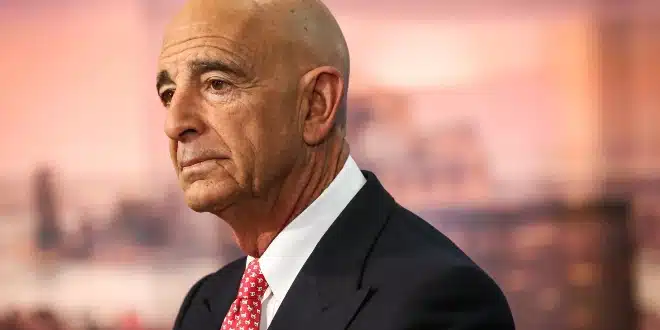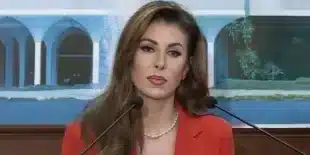In a visit underscoring growing diplomatic efforts in the Middle East, U.S. envoy Tom Barrack arrived in Beirut on Monday and met with Lebanese President Joseph Aoun and Prime Minister Nawaf Salam. His visit, part of a broader U.S. initiative to restore calm and promote reform in the region, also includes scheduled meetings with key political and religious leaders, as well as with Parliament Speaker Nabih Berri on Tuesday.
A Renewed Push for Stability
Following his discussions with Aoun and Salam, Barrack addressed the press, emphasizing that his return to Lebanon was driven by U.S. President Donald Trump’s “genuine interest in achieving regional stability.” Barrack described Lebanon as being at the heart of that effort, noting that peace and prosperity in the country are vital for broader regional security.
Barrack clarified that the United States is not attempting to dictate terms to Israel, stating, “We can’t compel Israel to act or refrain from acting in any particular way.” Instead, he described the U.S. role as one of facilitation—bringing together stakeholders and encouraging rational dialogue. “We’re here to use our influence to bring calm minds together to come to a conclusion,” he explained.
Disarmament and Domestic Reform
Addressing the complex issue of Hezbollah’s armed status, Barrack acknowledged that disarmament is a “very internal” matter for Lebanon. He added that while the U.S. would be disappointed if progress on this front is not made, Washington is not issuing threats or ultimatums. “There’s no consequence, there’s no threat, there’s no whip,” he said. “We’re here on a voluntary basis trying to usher in a solution.”
On sanctions, Barrack was clear that the U.S. has no immediate intention to penalize Lebanese officials. “We don’t want to add more logs to the fire,” he said, distancing himself from punitive diplomacy.
Expressing cautious optimism, Barrack praised Lebanon’s current political direction. “Your leaders have been more than helpful,” he remarked, adding that the reform steps already undertaken are “amazingly plausible and significant.”
Lebanese Leadership Presents a Strategic Plan
In a parallel development, President Aoun presented Barrack with a formal memo outlining Lebanon’s roadmap for implementing its prior commitments. According to a statement from the Presidency, the document reaffirms pledges made in the November 27, 2024 declaration, the ministerial statement of the Lebanese government, and Aoun’s own inaugural address.
The proposal underscores the need to extend the state’s authority throughout Lebanese territory, restrict arms possession to the national army, and ensure that decisions of war and peace are handled by Lebanon’s constitutional institutions.
Tensions with Hezbollah Remain High
Barrack’s visit takes place against the backdrop of heightened tensions following last year’s destructive conflict between Israel and Hezbollah, which concluded with a U.S.-brokered ceasefire agreement in November. Despite the truce, Israel has continued to conduct airstrikes within Lebanon, claiming the operations aim to prevent Hezbollah from rebuilding military capacity.
Hezbollah, meanwhile, has remained defiant. In a speech delivered Friday, group leader Sheikh Naim Qassem rejected the idea of disarming under current conditions. Framing his stance as a matter of national survival, Qassem said, “We are not ready to lay down our arms before the existential threat to Lebanon ends.” He further emphasized, “We will not surrender to Israel.”
According to Qassem, any potential disarmament discussion must be part of a broader Lebanese consensus, not one driven by international coercion. “We are ready for any action that leads to a Lebanese understanding,” he said. “But for Israel and America, we will not do this under any type of threat.”
What Lies Ahead
Barrack’s second visit to Beirut this month signals the growing urgency with which Washington views the Lebanese situation. While both sides appear to remain entrenched on critical issues like Hezbollah’s disarmament, the door for dialogue remains open. Whether the diplomatic momentum can translate into tangible progress remains uncertain, but the U.S. appears determined to keep Lebanon engaged on a path toward political reform and regional stability.


